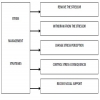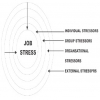Home | ARTS | Management Concepts & Organisational Behaviour
|
Consequences of Stress - Stress Management
Management Concepts & Organisational Behaviour - Stress Management
Consequences of Stress - Stress Management
Posted On :
Stress has serious consequences on health as well as job performance. Stress results in a variety of physiological, psychological, and behavioral consequences.
Consequences of Stress
Stress has serious consequences on health as well as job performance. Stress results in a variety of physiological, psychological, and behavioral consequences.
Stress takes its toll on the human body. Studies have found that students who are anxious about their exams are more susceptible to colds and other illnesses. As you are aware, many people experience tension or headache due to stress. Others get muscle pain and related back problems. These physiological ailments are attributed to muscle contractions that occur when people are exposed to stressors.
Stress results in various psychological consequences like job dissatisfaction, moodiness, and depression. Emotional fatigue is another psychological consequence of stress which is called job burnout.
There are three components of job burnout. The first one is emotional exhaustion, which plays a key role in the burnout process. It is characterized by lack of energy and a feeling that your emotional resources are exhausted. Emotional exhaustion is sometimes called compassion fatigue because the employee no longer feels able to give as much support and caring to clients.
The second one is depersonalization, which is identified by the treatment of others as objects rather than people. Employees subjected to burnout become emotionally detached from clients and cynical about the organization. This detachment reaches the point of callousness far beyond the level of detachment normally required in execution of tasks, more particularly in service sector. Depersonalization can be seen when employees strictly follow rules and regulations rather than try to understand the client’s needs and search for a mutually acceptable solution.
The third component of job burnout is reduced personal accomplishment. It refers to the decline in one’s competence and success. In other words, the person’s self-efficacy declines. In these situations, employees develop a sense of learned helplessness, as they no longer believe that they make a difference.
When stress becomes distress, job performance comes down and workplace accidents increase. High stress levels impair your ability to remember information, make effective decisions, and take appropriate actions. You probably experience this kind of distress in exams. You are likely to forget important information and commit mistakes.
Overstressed employees also tend to absent from work frequently. This is because stress makes people sick. Sometimes absenteeism is used as a stress coping mechanism. Normally, we react to stress through fight or flight. Absenteeism is a form of flight-temporarily withdrawing from the stressful situation so that we find time to re-energize ourselves.
Sometimes workplace aggression
may be the consequence of stress. Aggression represents the fight reaction to
stress. In its mildest form, employees engage in verbal conflict. They are not
likely to empathize with co-workers. Occasionally, it may lead to more
dangerous levels of workplace hostility.
Stress has serious consequences on health as well as job performance. Stress results in a variety of physiological, psychological, and behavioral consequences.
Physiological Consequences
Stress takes its toll on the human body. Studies have found that students who are anxious about their exams are more susceptible to colds and other illnesses. As you are aware, many people experience tension or headache due to stress. Others get muscle pain and related back problems. These physiological ailments are attributed to muscle contractions that occur when people are exposed to stressors.
Psychological Consequences
Stress results in various psychological consequences like job dissatisfaction, moodiness, and depression. Emotional fatigue is another psychological consequence of stress which is called job burnout.
Job Burnout
Burnout is the process of
emotional exhaustion, depersonalization, and reduced personal accomplishment
resulting from prolonged exposure to stress. The term “job burnout” was not
known 50 years ago; but it’s a much talked about phenomenon these days. Job
burnout is a complex process that includes the dynamics of stress, coping
strategies, and stress consequences. Burnout is caused by excessive
demands made on people who serve or frequently interact with others.
Interpersonal and role-related stressors cause burnout.
There are three components of job burnout. The first one is emotional exhaustion, which plays a key role in the burnout process. It is characterized by lack of energy and a feeling that your emotional resources are exhausted. Emotional exhaustion is sometimes called compassion fatigue because the employee no longer feels able to give as much support and caring to clients.
The second one is depersonalization, which is identified by the treatment of others as objects rather than people. Employees subjected to burnout become emotionally detached from clients and cynical about the organization. This detachment reaches the point of callousness far beyond the level of detachment normally required in execution of tasks, more particularly in service sector. Depersonalization can be seen when employees strictly follow rules and regulations rather than try to understand the client’s needs and search for a mutually acceptable solution.
The third component of job burnout is reduced personal accomplishment. It refers to the decline in one’s competence and success. In other words, the person’s self-efficacy declines. In these situations, employees develop a sense of learned helplessness, as they no longer believe that they make a difference.
Behavioral Consequences
When stress becomes distress, job performance comes down and workplace accidents increase. High stress levels impair your ability to remember information, make effective decisions, and take appropriate actions. You probably experience this kind of distress in exams. You are likely to forget important information and commit mistakes.
Overstressed employees also tend to absent from work frequently. This is because stress makes people sick. Sometimes absenteeism is used as a stress coping mechanism. Normally, we react to stress through fight or flight. Absenteeism is a form of flight-temporarily withdrawing from the stressful situation so that we find time to re-energize ourselves.
Tags : Management Concepts & Organisational Behaviour - Stress Management
Last 30 days 3423 views














